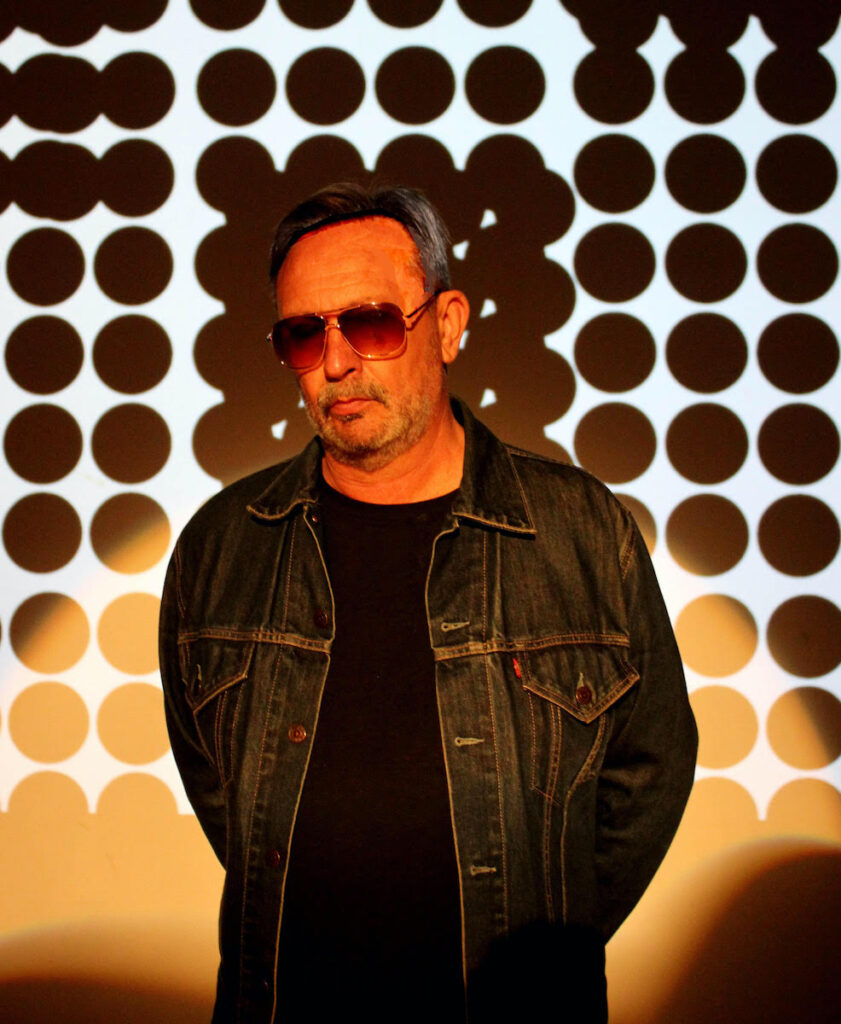The electronic music pioneer on how adaptation and determination have proven to be the watch words for his diverse music career
Stephen Mallinder rose to prominence with Cabaret Voltaire in the late 70s, becoming one of Rough Trade’s early signings and establishing an approach to experimental music-making which would prove to be hugely influential in the electronic/ club scene.
In the intervening years, Mallinder remained embedded in music, working in all manner of roles and gaining his doctorate. He has continued to create and innovate and currently works under various monikers, most notably as part of electronic trio Wrangler (with Phil Winter of Tunng-fame and Benge) and Creep Show, with US singer-songwriter John Grant.
What’s more, he also finds time to teach on Brighton University’s Digital Music and Sound Arts degree and masters courses. Mallinder was kind enough to speak to Creative Money about how he has learned to adapt and survive, financially, despite opting for a career in experimental music-making…
How do you feel the way you work with money has helped or hindered your creative journey?
“It’s interesting. I’m part of the Sound Art programme here at Brighton, so I work with students and it is scary. It’s always been scary, how creative people move on from there. It’s alright when you’re at university and you’ve got all these great ideas and you’ve got facilities, but it’s how you function outside there. It’s obviously much more problematic now, too, with what’s happened.
“If you do music, you can’t afford to be mono-cultural in the way you approach it”

“We’ve leapt into so many unknowns in the last 20 years, really since digitisation came along. Originally the arrival of the CD gave us this big splurge, or really, for older artists, the opportunity to re-sell their back catalogue, which worked for labels and that transformed everything, but since then the loss of ‘the product’ and the move to streaming and digital forms has massively affected people. So I think there had to have been an adaptation and I’ve kind of been through all of that.”
How did you first start to adapt?
“My adaptation was really that I realised I needed multiple ways of existing. My daughters were born in the early 90s and at that point, it was like, ‘Wow, this is really difficult…’ We were still making music, we still had our own label, but there wasn’t much [coming in] and it was hard to survive.
“I went to Australia and I lived in Australia for a while. Part of that was needing to find other ways of doing what I do and I ended up doing lots of different things. So I ran a radio station, I ran a record label, I started a production company.”
Want to make sure you never miss a post?
Sign up to the Creative Money newsletter!
Let me read it first >
That’s quite a variety of roles…
“I think I quickly adapted to the idea that if you do music, you can’t afford to be mono-cultural in the way you approach it. Or you can, but it’s difficult to go, ‘I make music, I make money out of selling music and doing gigs.’ That’s alright but you’ve got to be smarter with it, really. I ended up working in different parallel ways. I wrote for magazines and newspapers. I did all these things. That kind of prepared me for the world as it has been for the last 20 years, really, this ‘streamed world’. I rapidly became flexible in how I saw it.”
“When I started, you didn’t really do it for money, but then you make money out of it and you feel, ‘Oh well, I do well enough that it owes me a living’. It doesn’t work that way, though, so I think you just have to be flexible. If you want to make music then you just have to be understanding. Your expectations have to be reined in a little bit. Perhaps what I’m saying is that there has to be separation between the creative process and the entrepreneurial, money-making process. You have to spread those things a little bit apart.”
How do you make those decisions? What’s the line for you in terms of what you feel is reasonable to do for money as an artist?
“I think it’s a little bit easier for me, because I’ve not come from that world of commercial music, I’ve come from experimental, electronic music, club music, whatever you would say. It’s never been mainstream, so I’ve never been put in that position of saying, ‘Would you do this… to make money.’ I can’t remember too many instances in the past where I’ve gone, ‘I can’t do that, even if the money is really good.’ I’ve never really been put in such a compromising position. The offers for me tend to be more left field, whether it’s working for Manchester International Festival or BFI. I don’t feel I have had to make those ethical decisions.
“I love making music, but we’re not an elite, we’re not above, or better. Sometimes you have to work.”

“I’ve always tried to make sure that what I do connects with music, so even when I was writing or when I was running a radio station to make money, the core of what I was doing was still around music. I was happy to work around parts of music – I used to put massive gigs on in Australia, for thousands of people, which were really successful – but I still felt as though I was really connected with music.
“I guess you start to have this kind of portfolio career and I do kind of say yes to most things – and then regret it later! Not because I don’t think it’s been a good thing to do, but usually with me just because I think, ‘Why the fuck did you say you’d do that? I haven’t got any time to do it…’ It’s never an ethical or a financial thing, it’s usually a time thing with me. But I tend to get asked to do nice things, so I’m lucky.”
But the fact that you get offered that kind of work is, I would imagine, down to the decisions and the connections that you’ve made…
“I’m lucky, really, in the sense that I’m from a period where music and electronic music as we were making it in that early period was incredibly significant and held a much bigger role in people’s lives. There were less people making music, the impact was greater and it was getting into people’s homes because there was product in that way. I think what has changed is that with everything becoming digital and things going online, it has democratised it, so there’s just so much of it. I don’t believe it’s dumbed it down, I just believe it’s increased the amount of work that’s been produced and the difficult thing for people now is to just make themselves heard through the noise.
“You have to have your mind set to go, ‘I will never stop doing what is the core sense of myself’. But you also have to accept that It’s going to be a bumpy ride.”

“Also, music that 20/30 years ago was very core to people’s lives is just part of people’s lives is now – a smaller part of a bigger entertainment or digital creative economy. It’s a smaller slice of the cake now.”
So, knowing that, what would you recommend people do to sustain themselves while making music?
“I just think: ‘Don’t shut anything off.’ The next thing you do might not seem totally relevant to what your primary path is, like, I love making music and doing all those things, but I may end up doing something that is not literally based around me making a piece of music, but what it might lead to is something interesting. So, you know, I enjoy teaching in Sound Art and working with the people who run the programme. It’s nice to do that because it offers so many different things. You need to think much more broadly in terms of what you’re doing, nowadays.”
One of the big struggles is how variable people’s incomes are. Have you figured out anything that helps you deal with that?
“Quite honestly, not really! Sometimes you have to work – that’s the human condition. As much as I love making music, we’re not an elite, we’re not above, or better [than others]. Sometimes you have to do that. The only thing that is difficult and this is probably the nub of it, really: for a lot of artists and musicians they don’t really sit comfortably in those worlds. They make music because it’s an expression of who they are and sometimes that’s because not everybody sits easily in the outside world. I think that’s the difficult thing.”
Struggling with your cash flow as a freelancer? Take a look at our guide: ‘How to manage your money on a variable income’
So what has proved helpful for you in this process of adapting?
“Well, I did a degree when I was really young and was the first member of my family to do it, but it did kind of make me believe that I had other things to offer, I suppose. I think that’s the difficult thing. You have to sometimes go, ‘Well, I’m going to have to do this…’ You have to separate it. Like everybody else, I’ve adapted to the situation and thought, ‘Well I need to be doing other stuff.’
“You have to have your mind set to go, ‘I will never stop doing what is the core sense of myself’, whether it’s music or making films. But you also have to accept that it’s going to be a bumpy ride. I accept that there will be times when this is the primary part of my life and there may be times when I’m not flavour of the month and I’ve got to do other things.
“But I think people who really want to do these things, they’ll never stop. I think if you’re really into it, you never give up. You can’t. You just have to adapt. We’re humans, we have to adapt.”

How I Make It Work is a series of interviews with a variety of creative professionals, where we discuss personal experiences and lessons learned about money in the creative industries.
How can we help you?
What issues are you facing? What questions do you have about managing your money in the creative industries? What would be most helpful to you?
We don’t have all the answers, but maybe we can find someone that does.
